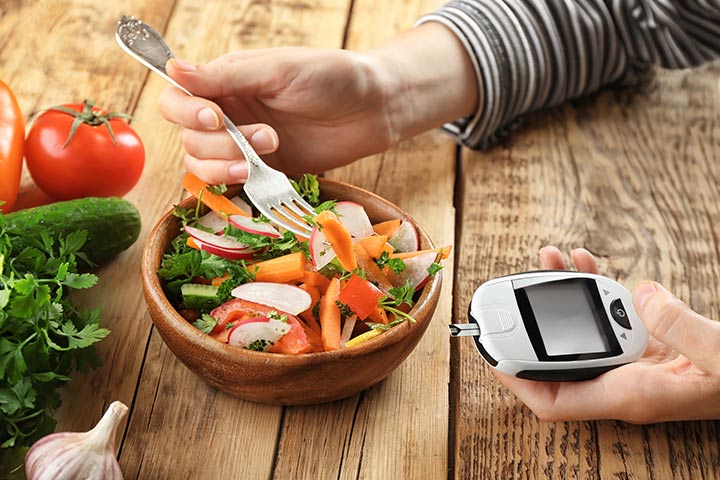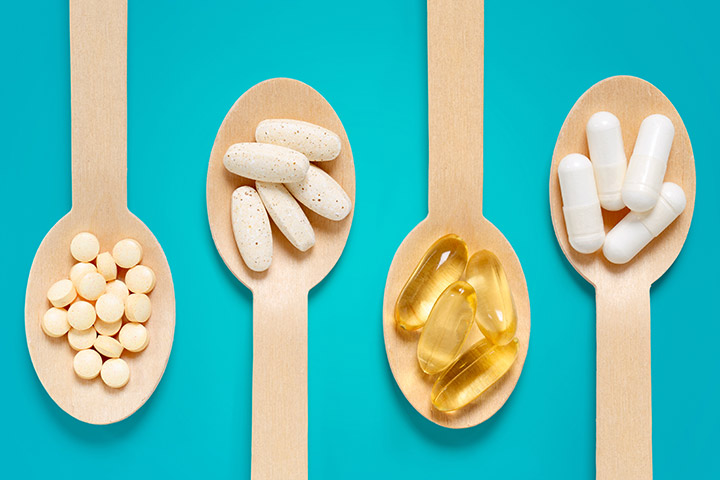
Image : Shutterstock
Even if you don’t have the most balanced diet ever, breast milk is still considered to be more beneficial for your little one as compared to the infant formula. The mom’s milk contains an appropriate dose of fats, proteins, carbohydrates, and vitamins. It also has leukocytes, which are the living cells known to be present only in the breast milk. These cells help us fight the infections and can’t be added to the formula milk (1). As per the American Academy of Pediatrics, breastfeeding is recommended for babies up to the age of six months to help him/her fight infections and diseases (2). Given how important breastfeeding is, it is essential to ensure you get proper nutrition during this phase. Here, we bring you tips that can help make your breast milk even more nutritious:
1. Adjust The Number Of Calories You Consume
During breastfeeding, you may have to increase your intake of food a little bit. Maybe, an additional 400 calories or so to ensure you maintain your energy (3). You can opt for nutrient-rich foods and make sure that you don’t overdo it. Going overboard might only delay your weight loss after pregnancy even further.
2. Consume Protein-Rich Foods
You can go for foods rich in protein such as eggs, lentils, beans, and lean meat (4). This may be important to maintain a high nutritional value in your breast milk. While you can consume seafood, it should have low mercury content to avoid increasing its levels within your body. Seafood like canned tuna, shrimp, and salmon may be a good choice.
3. Go For A Balanced-Diet
Have a balanced diet that includes a combination of whole grains, fruits, and veggies. Make sure that you wash your veggies and fruits carefully before you consume it; this would help prevent you and your baby from getting exposed to pesticide residues (5).
4. A Mix Of Different Foods
If you eat a variety of things, it may help alter your breast milk’s flavor. And this, in turn, will expose your little one to a palette of different flavors. It also might make your work easier down the road when your munchkin starts eating solid foods; he/she may be much more accepting (6).
5. Keep In Mind The Notorious Allergic Reactions
At times, your little angel may be sensitive to certain foods that you eat. Anything from spicy foods to dairy products might invoke certain allergic symptoms such as diarrhea or vomiting. If you notice these allergic reactions, remember that it is because of what you ate and not due to the breast milk (7). You can also consult your doc if you feel particularly concerned about your baby’s allergic reactions to different foods.
6. Ask About Nutritional Supplements
The ultimate combination of your breast milk with a well-balanced diet is enough to meet the nutritional requirements for you and your angel. However, if you still have doubts regarding the same, you can always seek help from a medical professional about mineral and vitamin supplements. One supplement that your baby may need is vitamin D since it helps with the absorption of calcium into bones (8).
7. If Vegetarian, Increase Nutritional Consumption
If you are a vegetarian, it becomes more essential to ensure that the food you consume contains the required nutrients. Have a diet rich in protein, iron, and calcium such as whole-grain products, cereals, lentils, green vegetables, and dairy products, among others. Also, you can eat citrus fruits, which are rich in vitamin C (9).
8. Drink Lots Of Water
While your fluid intake will not have any influence on how much milk you can produce, you should drink water each time you feel thirsty. In fact, try having it after each feeding.
9. Limit Your Caffeinated Beverages
Try and not to have a lot of caffeinated drinks since it can cause your little one to feel less sleepy and hence, fussier. So, even if you do drink, do so in moderation.
10. Avoid Alcohol
According to the American Academy of Pediatrics, try to keep away from alcohol when you are breastfeeding since it can pass on to your baby through the breast milk (10).
If you have any other tips in mind, please share it with your fellow new mothers in the comments section below!






















